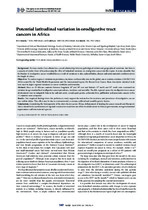Potential latitudinal variation in orodigestive tract cancers in Africa
Date
2018Author
Adeola, Henry Ademola
Adefuye, Anthonio Oladele
Jimoh, S.A.
Metadata
Show full item recordAbstract
BACKGROUND. Previous studies have alluded to a causal relationship between pathological entities and geographical variations, but there is
a paucity of studies from Africa discussing the effect of latitudinal variation on orodigestive cancers in this region. It seems plausible that
the burden of orodigestive cancer would differ as a result of variations in diet, cultural habits, climate and environmental conditions down
the length of Africa.
OBJECTIVES. To analyse regional variations in prevalence, incidence and mortality data in the global cancer statistics database (GLOBOCAN
2012) curated by the World Health Organization and the International Agency for Research on Cancer. Basic descriptive statistical tools
were used to depict regional variations in cancer morbidity and mortality.
METHODS. Data on 13 African countries between longitude 20⁰ and 30⁰ east and latitude 35⁰ north and 35⁰ south were examined for
variation in age-standardised orodigestive cancer prevalence, incidence and mortality. Possible regional causes for orodigestive tract cancer
development were investigated. Data on lip and oral cavity, oesophageal, gastric, colorectal, liver, gallbladder and pancreatic cancers in the
RESULTS. Our empirical findings from this preliminary study support the notion that the incidence and prevalence of orodigestive cancers
vary within Africa. This effect may be due to environmental, economic, political and possibly genetic factors.
CONCLUSIONS. Considering the heterogeneity of the above factors across Africa, disbursement of funding for cancer research and therapy in
Africa should be focused in terms of regional variations to make best use of the fiscal allocation by African governments, non-governmental
organisations and international agencies.

